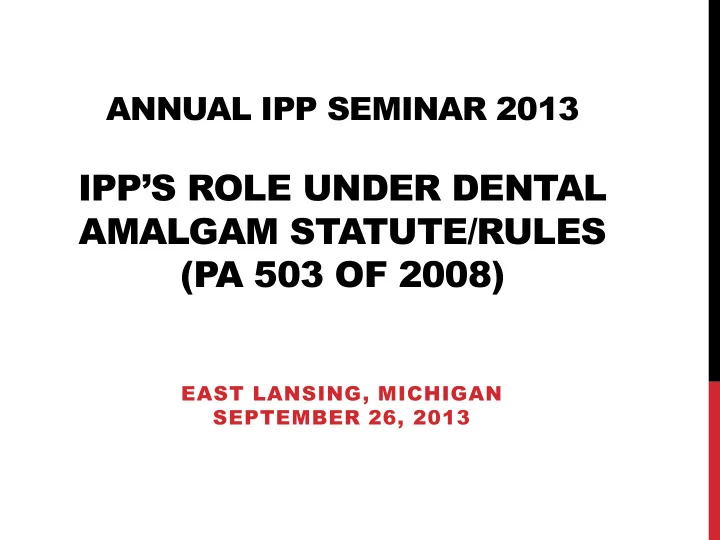

ANNUAL IPP SEMINAR 2013 IPP’S ROLE UNDER DENTAL AMALGAM STATUTE/RULES (PA 503 OF 2008) EAST LANSING, MICHIGAN SEPTEMBER 26, 2013
LITTLE SHOP OF HORRORS “Well, I made a lot of holes and now I gotta fill them up with this here silver stuff. ”
DENTAL OFFICES Studies have found that as much as 50% of the mercury entering POTWs is contributed by dental offices. New fillings placed. Old fillings drilled out. Amalgam waste flushed out of chair-side drains enter sewer. Some particles settle out; others carried to POTW.
IMPACTS AT POTW Physical POTW processes remove about 90% of mercury. Mercury removed ends up in POTW biosolids. Mercury not removed discharged by POTW to receiving stream. May cause POTW to violate NPDES mercury discharge limit, or biosolids problems.
POTW RESPONSES Require amalgam separators. Require implementation of BMPs. Implement numeric limits in permits.
MI ACT 503 (2008) Requires dental offices to install separators by 12/31/13. Separators must remove at least 95% per “Dental — ISO 11143:2008 equipment Amalgam separators. ”
ACT 503 RULES Michigan Administrative Code (Part 8, Dental Amalgam, R 338.11801 et seq.) Requirements for separators (installation, operation, maintenance, sizing, certification, testing). Required BMPs for dental amalgam waste (collection, disposal, and recycling). Records retention/inspection requirements. Verification of compliance on license renewal. Sanctions for noncompliance (including fines).
SO FAR, SO GOOD...? Proper installation, operation, and maintenance of amalgam separators that meet or exceed the ISO 11143 standard (along with proper maintenance of plumbing systems) may be one of the most effective means to significantly reduce mercury amalgam discharges from dental offices to POTWs (short of using holding tanks or using alternatives to amalgam). But it may not be enough.
PROBLEMS… What if dentist office is in full compliance with Act 503, but sampling shows that office still contributing mercury in excess of local limits? Can POTW do something about it?
PROBLEMS… Preemption: Act 503 expressly preempts and supersedes any conflicting, different, or additional standards or requirements on dentists than those contained in the Act or the Rules. And Act 503 expressly prohibits: Requiring a dentist to obtain a permit that limits the discharge of mercury into wastewater with a limitation greater than that capable of being achieved by full compliance with Act 503.
PROBLEMS… So what can POTW do? Can adopt ordinance that mirrors Act 503/Rules. Can issue permits to dentists requiring compliance with ordinance that mirrors Act 503/Rules. But: Cannot require dentists to comply with numeric local limit for mercury.
PROBLEMS… Michigan is the only state so far to preempt local ordinance requirements and numeric limits. This preemption conflicts with Federal/State Pretreatment laws and regulations.
PROBLEMS… POTWs must have the authority to apply and enforce pretreatment standards and requirements that are at least as stringent as those required by state and federal laws. POTWs with IPPs are required to develop and enforce local limits to implement the general (pass through/interference) and specific prohibitions. And POTWs are specifically required to develop and enforce local limits for mercury.
PROBLEMS… The general and specific prohibitions, including local limits, apply to all nondomestic users, including dentists. If a nondomestic user’s discharges do not meet applicable pretreatment standards and requirements or would cause the POTW to violate its NPDES permit, the POTW must have the authority to deny or condition those discharges and to take enforcement action for noncompliance.
PROBLEMS… So … If POTW determines that discharge from dental office does not comply with local limit for mercury that applies to all other nondomestic users, and dental office already in compliance with Act 503 separator and BMPs, Act 503 by its terms prohibits the POTW from taking any further action to condition or deny that discharge.
PROBLEMS… Due to the conflict between Act 503 and the Federal/State pretreatment laws and regulations: POTWs forced to make choice which law (503 or CWA) to violate if they have a discharge of mercury from a dental office that exceeds local limit for mercury. If apply local limit – violates Act 503. If don’t apply local limit – violates NPDES permit requirement to implement IPP.
PROBLEMS… Decision influenced by the particular circumstances of the POTW in each case: POTW meeting mercury limit (WQS 1.3 ng/l)? POTW discharging to meet LCA (Level Currently Achievable) with approved PMP (pollutant minimization plan)? Already using all reasonable cost-effective control measures of other known sources of mercury? POTW knows dental offices not meeting local limit?
PROBLEMS… Problems, problems, problems all day long. Will my problems work out right or wrong? The dentists don’t like anything I do. EPA and/or MDEQ seem to feel the same way too. (Apologies to the Everly Brothers.)
Recommend
More recommend